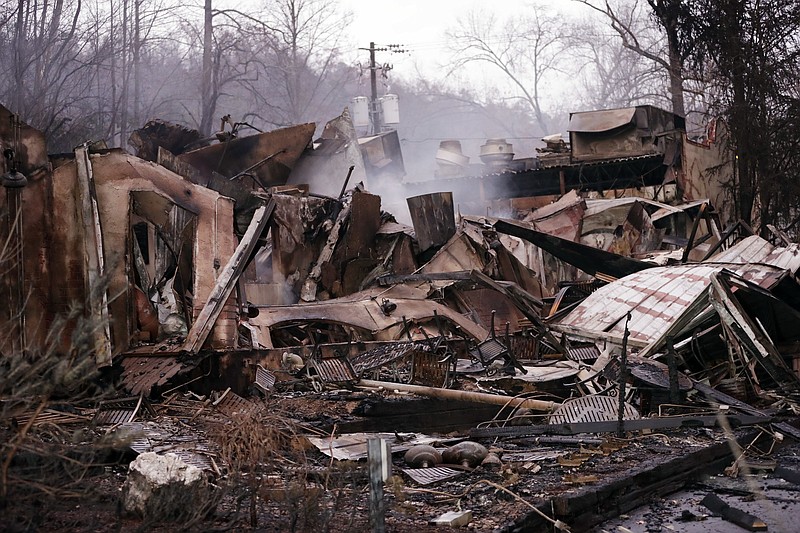A man whose wife and children died in the 2016 deadly wildfires in Gatlinburg is suing the lawyers he says cost him and more than 500 other victims a chance at restitution from the federal government.
Michael Reed, whose wife and two children burned to death after being trapped by a wall of fire in the blaze, has filed a legal malpractice lawsuit in Davidson County Chancery Court against two of Tennessee's top tort attorneys -- Sid Gilreath and Gordon Ball -- and renowned Florida tort law firm Cohen Milstein Sellers & Toll.
The lawsuit accuses the lawyers of bungling litigation they filed on behalf of Reed and 524 other wildfire victims against the U.S. Department of Interior and the National Park Service.
U.S. District Judge Ronnie Greer earlier this year tossed out that litigation on a legal technicality. Greer ruled that although the victims had presented ample evidence the Park Service failed to warn Gatlinburg residents, emergency personnel and city leaders of the deadly fire's approach, their attorneys failed in preliminary administrative claim forms to notify the government agency of the failure-to-warn claim.
"The (administrative forms) contain no information about a failure to warn or facts related to a failure-to-warn claim," Greer wrote in the ruling.
Greer said in his ruling that anyone who seeks to hold a government agency responsible for damages must first file an administrative claim with the government and give the agency a chance to respond. It is only after a government agency denies a claim that a citizen can sue.
Although Reed's attorneys filed an administrative claim on behalf of the Gatlinburg wildfire victims, they did not include the failure-to-warn allegation -- which turned out to be the linchpin of their lawsuit.
After Greer issued his ruling, Ball accused the government attorneys of sandbagging him into believing their initial claim forms were just fine -- until the deadline to revise the forms ran out. Greer, though, refused to reconsider his ruling, which is now being appealed to the 6th Circuit U.S. Court of Appeals.
'This was legal malpractice'
In all, 14 people died and more than 2,000 homes and businesses were damaged or destroyed when a wildfire that began in the Great Smoky Mountains National Park spread to Gatlinburg and surrounding neighborhoods in Sevier County in November 2016.
The fire started on the remote Chimney Tops peaks inside the Smokies on Nov. 23, 2016, during a record-setting drought. Greg Salansky, the park's fire management officer, decided to try to contain the fire rather than attack it directly, despite forecasts of high winds and "critically dry" conditions.
Local officials only learned about the fire on the morning of Nov. 28, 2016, when a Gatlinburg fire captain called Salansky about the clouds of smoke hanging over town -- and didn't learn until 12:30 p.m. that day that the fire was headed their way.
When winds topped 60 mph around 6 p.m., the fire wrapped around the city on both sides. Most of the fire's victims, including Reed's wife and daughters, died on the western side of town, where police and firefighters delivering evacuation notices failed to reach everyone in time.
Greer sided with the wildfire victims in their claim the Park Service failed in its mandatory duty to warn Gatlinburg leaders and citizens the fire was spreading fast and headed for residential neighborhoods surrounding the Smokies.
But government attorneys fired back with a motion to dismiss the litigation, citing the absence of the failure-to-warn claim in the victims' initial administrative claim forms.
Reed's new attorney, David Randolph Smith, argues in the legal malpractice lawsuit that Ball, Gilreath and the Florida law firm dropped the ball in their handling of the claim forms and responding to the government's motion to dismiss.
"The standard of care required Gilreath and Ball to be familiar with and research the requirements for bringing a lawsuit," Smith wrote. "Gilreath and Ball deviated from the standard of care by filing suit in May 2018 without first having submitted a claim asserting a tort for failure to warn (and) failing to evacuate. This was legal malpractice.
"Even after suit had been filed, there was still time for Gilreath and Ball to file a new (administrative claim) and initiate a new lawsuit for failure to warn," Smith continued.
As proof the attorneys knew they had fouled up the case, the legal malpractice lawsuit includes a text message to Reed from Lance Baker, a lawyer working under Gilreath and Ball in the wildfire litigation, after Greer's ruling.
"I'll be honest with you, man," the text reads. "They should've made this argument a long time ago. Gordon (expletive) up big time and it's cost everyone. I told them about the government not agreeing to challenge the (claim forms) two years ago. They didn't care and didn't think it was an issue. Turns out that's exactly what the federal court based their decision on in dismissing the case."
The legal malpractice lawsuit notes that attorneys who filed a similar lawsuit against the government on behalf of private insurance companies that paid wildfire claims did include the failure-to-warn allegation in their administrative claim forms. That lawsuit remains pending as a result.
Read more at tennesseelookout.com.
